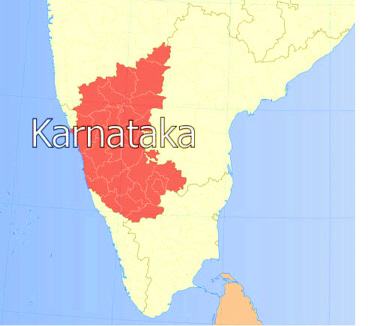
(Bildquelle: PlaneMad/Wikipedia. -- CC-by-sa)

(Bildquelle: PlaneMad/Wikipedia. -- CC-by-sa)
Zitierweise / cite as:
Hodson, Thomas: An elementary grammar of the Kannada, or Canarese language. -- 11. Causal Verbs (§ 112 - 113). -- Fassung vom 2011-08-24. -- URL: http://www.payer.de/hodson/hodson11.htm
First published as: Hodson, Thomas: An elementary grammar of the Kannada, or Canarese language ; in which every word used in the examples is translated, and the pronunciation is given in English characters. -- 2. ed. -- Bangalore : Wesleyan Mission Press, 1864. -- 128 p. ; 23 cm.
First time published here: 2011-08-24
Revisions:
©opyright: Public domain
This text is part of the section Sanskrit und Indien of Tüpfli's Global Village Library
If you don't get the diacritics displayed, install a Unicode font like Tahoma.
112. Causal verbs are formed by adding the affix ಇಸು isu, to the root of any verb of pure Canarese origin ; as
The verbs so formed are conjugated like any regular verb ending in ಉ u ; as the following example.
113. Root ಮಾಡಿಸು māḍisu, Cause to do
| Present ವರ್ತಮಾನ vartamāna |
ಮಾಡಿಸುತ್ತ māḍisutta ಮಾಡಿಸುತ್ತಾ |
causing to do | Root +
ಉತ್ತ utta Root + ಉತ್ತಾ uttā |
| Past ಭೂತ bhūta |
ಮಾಡಿಸಿ mādisi |
having caused to do | Root + ಇ i |
| Negative ನಿಷೇಧ niṣēdha |
ಮಾಡಿಸದೆ māḍisade |
not having caused to do | Root + ಅದೆ ade |
| Present & Future ವರ್ತಮಾನ & ಭವಿಷ್ಯತ್ತು vartamāna & bhaviṣyattu |
ಮಾಡಿಸುವ māḍisuva |
who or which causes, or will cause, to do | Root + ಉವ uva |
| Past ಭೂತ bhūta |
ಮಾಡಿಸಿದ māḍisida |
who or which caused to do | Root + ಇದ ida |
| Negative ನಿಷೇಧ niṣēdha |
ಮಾಡಿಸದ māḍisada |
who or which does not, did not, or will not cause to do | Root + ಅದ ada |
| Present & Future ವರ್ತಮಾನ & ಭವಿಷ್ಯತ್ತು vartamāna & bhaviṣyattu |
ಮಾಡಿಸುತ್ತಿರುವ māḍisuttiruva |
who or which is, or will be, causing to do | Present gerund + ಇರುವ iruva1 |
| Past ಭೂತ bhūta |
ಮಾಡಿಸುತ್ತಿದ್ದ māḍisuttidda |
who or which was causing to do | Present gerund + ಇದ್ದ idda2 |
| Perfect & Future perfect | ಮಾಡಿಸಿರುವ māḍisiruva |
who or which has, or will have, caused to do | Past gerund + ಇರುವ iruva1 |
| Pluperfect | ಮಾಡಿಸಿದ್ದ māḍisidda |
who or which had caused to do | Past gerund + ಇದ್ದ idda2 |
1 ಇರುವ iruva, who or which is, or will be, is the present and future relative participle of the verb ಇರು iru, Be. See its conjugation (§ 109.)
2 ಇದ್ದ idda, who or which was, is the past relative participle of ಇರು iru.
| ಮಾಡಿಸ māḍisa |
to cause to do | Root + ಅ a |
| ಮಾಡಿಸಲು māḍisalu |
Root + ಅಲು alu | |
|
ಮಾಡಿಸಲಿಕ್ಕೆ māḍisalikke |
Root + ಅಲಿಕ್ಕೆ alikke |
Root + personal affixes.
Let me, &c. cause to do.
| Person ಪುರುಷ puruṣa |
Singular ಎಕವಚನ ekavacana |
Plural ಬಹುವಚನ bahuvacana |
| 1st. ಉತ್ತಮ್ uttama |
ಮಾಡಿಸಲಿ mādisali |
ಮಾಡಿಸಲಿ māḍisali |
| 2nd. ಮಧ್ಯಮ madhyama |
ಮಾಡಿಸು māḍisu |
ಮಾಡಿಸಿರಿ māḍisiri |
| 3rd. ಪ್ರಥಮ prathama mascul., fem., neuter |
ಮಾಡಿಸಲಿ māḍisali |
ಮಾಡಿಸಲಿ māḍisali |
1 The 2nd person singular Imperative is the root of the verb.
Root + personal affixes.
I, &c. do not call, will not call, had not, or would not have caused to do.
| Person ಪುರುಷ puruṣa |
Singular ಎಕವಚನ ekavacana |
Plural ಬಹುವಚನ bahuvacana |
| 1st. ಉತ್ತಮ್ uttama |
ಮಾಡಿಸೆನು māḍisenu |
ಮಾಡಿಸೆವು māḍisevu |
| &c. &c. | ||
I cause to do, &c.
Present gerund māḍisutta ಮಾದಿಸುತ್ತ + personal affixes
| Person ಪುರುಷ puruṣa |
Singular ಎಕವಚನ ekavacana |
Plural ಬಹುವಚನ bahuvacana |
| 1st. ಉತ್ತಮ್ uttama |
ಮಾಡಿಸುತ್ತೇನೆ māḍisuttēne |
ಮಾಡಿಸುತ್ತೇವೆ māḍisuttēve |
| &c. &c. | ||
I caused to do, &c.
Past relative participle ಮಾಡಿಸಿದ māḍisida + personal affixes
| Person ಪುರುಷ puruṣa |
Singular ಎಕವಚನ ekavacana |
Plural ಬಹುವಚನ bahuvacana |
| 1st. ಉತ್ತಮ್ uttama |
ಮಾಡಿಸಿದೆನು māḍisidenu |
ಮಾಡಿಸಿದೆವು māḍisidevu |
| &c. &c. | ||
I shall or will cause to do, &c.
Future relative participle ಮಾಡಿಸುವ māḍisuva + personal affixes.
| Person ಪುರುಷ puruṣa |
Singular ಎಕವಚನ ekavacana |
Plural ಬಹುವಚನ bahuvacana |
| 1st. ಉತ್ತಮ್ uttama |
ಮಾಡಿಸುವೆನು māḍisuvenu |
ಮಾಡಿಸುವೆವು māḍisuvevu |
| &c. &c. | ||
I shall perhaps, or, I may cause to do, &c.
Past gerund ಮಾಡಿಸಿ māḍisi + personal affixes.
| Person ಪುರುಷ puruṣa |
Singular ಎಕವಚನ ekavacana |
Plural ಬಹುವಚನ bahuvacana |
| 1st. ಉತ್ತಮ್ uttama |
ಮಾಡಿಸಿಯೇನು māḍisiyēnu |
ಮಾಡಿಸಿಯೇವು māḍisiyēvu |
| &c. &c. | ||